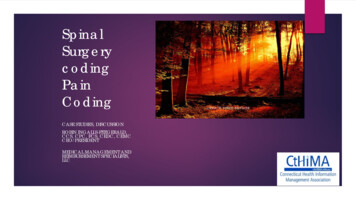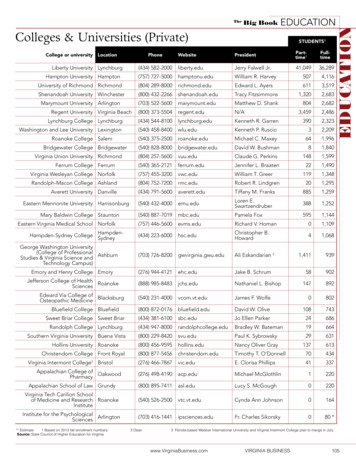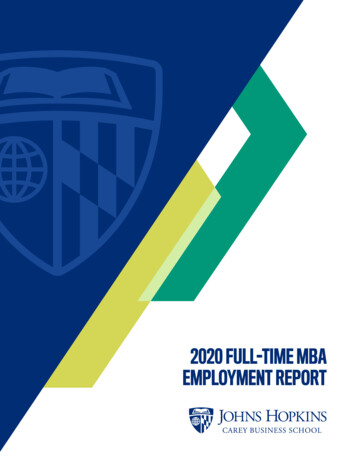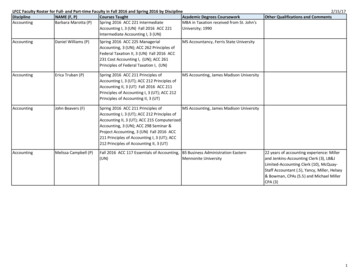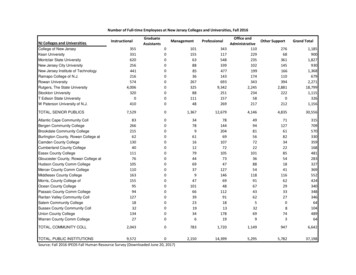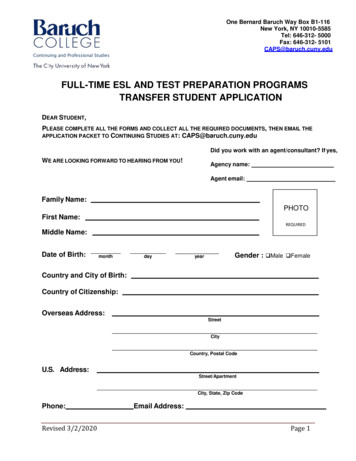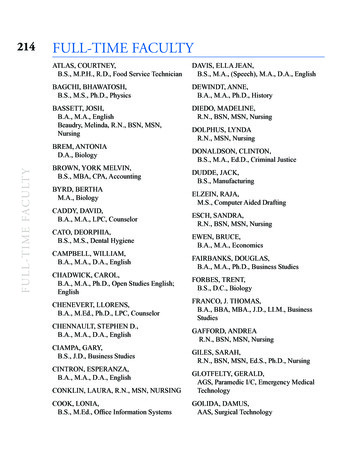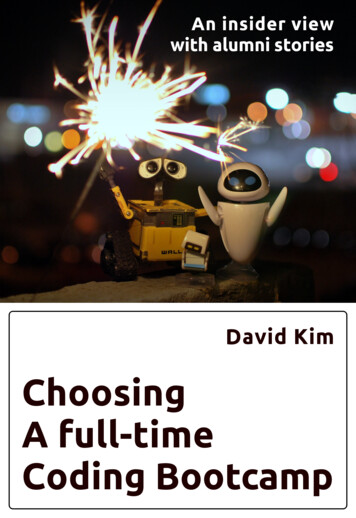
Transcription
Choosing a full-time CodingBootcampwith alumni storiesDavid KimThis book is for sale athttp://leanpub.com/coding-bootcampsThis version was published on 2013-08-23This is a Leanpub book. Leanpub empowers authors andpublishers with the Lean Publishing process. LeanPublishing is the act of publishing an in-progress ebookusing lightweight tools and many iterations to get readerfeedback, pivot until you have the right book and buildtraction once you do.This work is licensed under a Creative CommonsAttribution-NoDerivs 3.0 Unported License
Tweet This Book!Please help David Kim by spreading the word about thisbook on Twitter!The suggested tweet for this book is:I just bought https://leanpub.com/coding-bootcamps/ theguide to choosing a full-time #codingbootcampThe suggested hashtag for this book is #CodingBootcamp.Find out what other people are saying about the book byclicking on this link to search for this hashtag on Twitter:https://twitter.com/search/#CodingBootcamp
ContentsAcknowledgement . . . . . . . . . . . . . . . . . .Introduction . . . . . . . . . .Preface . . . . . . . . . . . .A Toolkit for Your DecisionGoals . . . . . . . . . . . .i.iiiiiivvi1 Getting In . . . . . . . . . . . . . . . . . . . . .1.1 Coding Exercises . . . . . . . . . . . . . .1.2 New Exercise: Listen to Yourself . . . . . .1.3 Admissions: Learning From Those WhoWent Before Us . . . . . . . . . . . . . . .1.4 Geography: Does It Matter? . . . . . . . .1.5 Class Size & Your Day In Life . . . . . . .1.6 About Changing Trends . . . . . . . . . .12461012142 About the author . . . . . . . . . . . . . . . .2.1 Follow David @findinbay . . . . . . . . .1516Appendix: Prep Resources . . . . . . . . . . . . .Further Reading . . . . . . . . . . . . . . . . . .1819
CONTENTSBeginner Coding Tutorials . . . . . . . . . . . .JavaScript Tutorials . . . . . . . . . . . . . . . .Coding Blogs & Newsletters & Other Sites YouShould Know . . . . . . . . . . . . . . . .Massive Open Online Courses . . . . . . . . . .22242526
AcknowledgementThanks to all of the hard-working people involved infurthering technical education in the world today.And of course, thanks mom & dad!
IntroductionWhen you come to a fork in the road, take it. - Yogi Berra
iiiIntroductionPrefaceYou are about to start on a fun journey. Do not sit backwith this information; instead, actively engage it. Use it asa starting point for further inquiries. Keep learning to codeindependently of your application process. Keep learningbroadly and explore your interests. Certainly, other questions should come to your mind. Feel free to talk to friendsor reach out to people at Coding Bootcamps to further yourresearch.If you haven’t already asked, ask yourself why you wantto attend a coding bootcamp. Are you a career switcher?Are you seeking to add a skill to your existing portfolio?Do you want a convenient, and guided way to learn a newprogramming language? Or are you simply enticed by thedream of becoming your own technical co-founder, andbuilding the next famous Silicon Valley company?
IntroductionivA Toolkit for Your DecisionI wrote this brief guide as a tool to help you decide whetherto attend an intense, full-time coding bootcamp. You mayhear others describe it as a hacker school or programmingschool.It is a big leap to quit your day job, and enroll in afull-time Coding Program. Should you take the plunge?The decision to attend can be financially expense, andpersonally disruptive. And there are other related questionson your mind: Does it make sense move to a new City? WillI have a job after I graduate? Who will my classmates be?Do I really want to work as a software developer? Howgood a developer will I actually become after a full-timeprogram? Couldn’t I just learn to program on my own?You are reading this guide, because you want to be betterinformed about your decision. You do not want to spendnext several months of your life and upwards of 11,000of investment only to be unemployed, or worse, to regretyour decision and still be uncertain about what you wantout of life and career. That’s why I wrote this guide. Ihad the privilege of working closely with coding bootcampstaff and with high-tech managers. This guide aggregatesinsider insights and experiences to share with you.This guide is also a set of stories, because listening to storiesof others can help us navigate our own. And learning totell stories will be an important component of making yourdecision as well as succeeding in a job search. I hope that
Introductionvthe bits and pieces of stories and advice found in this guidewill be useful to you, and save you time in your exploration.
viIntroductionGoalsRemember. Only you can decide what you want out oflife! Our role simply is to furnish you with constructivethoughts and useful information to help you in your journey. To that end, our goals are:1. Provide general overview of Coding Bootcamps andtheir context2. Identify and aggregate pertinent information to saveyou time3. Introduce stories of other people who took the plunge4. Curate learning materials to help further your learning process
1 Getting InKnow thyself - Ancient Greek maxim
2Getting In1.1 Coding ExercisesExercise 1: Write a function to compute factorial of a givennumber, n, denoted n!.A factorial is a product of all positive integers from 1 toa given number, n. For example, 5 factorial (written as 5!)is 5x4x3x2x1 120. If you were sitting next to someonewho knew very little about programming, how would youbegin to outline what you are trying to do? How wouldyou outline the structure of your code? Let’s try writing apseudocode¹. It is what it sounds like - an outline of a codeuseful for thinking out loud and communicating with yourpair visually. It won’t actually “run.”12345factorial method(argument)answer argument x (argument - 1) x (argument\- 2) x . x 2 x 1return answerend methodThe trick is to try to build on small successes and makethem bigger. First, make sure you can save the argumentinto a variable and return it. Does it work? Now, build ona layer of complexity by making it compute argument x(argument - 1). Is the returned answer what you expectedit to be? And so on.Exercise 2: Compute 10!¹https://en.wikipedia.org/wiki/Pseudocode
Getting In3Many programmers first write a recursive² solution to thiscoding challenge. Now, use the function you wrote tocompute 100!If you wrote a recursive solution to compute 5! or 10! did itwork for 100! or 1000? So, now what?If a recursive solution doesn’t quite work, because of thecomputing time, how would you restructure your code? Isthere a way to compute the multiplication non-recursivelyfrom 1 to n? And how does that improve performance?Could you refactor your code further to take advantage ofa technique called memoization³?Exercise 3: Take n! and find and print the sum of the digitsof the answer. For example, for 5!, the answer is 120, andthe sum of its digits is 1 2 0 3.You see how we are building on small pieces of existingknowledge. After you’d given it a good faith effort, if youwould like to reference a solution (just one among manypossible), then check out this repo of Ruby implementation:Factorial Sum⁴Did you enjoy trying to figure this problem out? Wouldyou enjoy doing so with someone else next to you? Doesthe process of optimizing your code and make it computefaster appeal to hub.com/dklounge/euler exercises/blob/master/pr20factorialsum.rb
Getting In41.2 New Exercise: Listen to YourselfYou either 1) didn’t have enough background to successfulyattempt writing a factorial function and the variationsthereof, or 2) enjoyed the exercise and want more.Before we suggest some resources for those of you on path#1 and on path #2, let’s pause. It is important to reflectand pick-up signals from this experience about yourself. Inour opinion, there is no shame in being frustrated. Thereis only shame in ignoring the meaning of that frustration.Try to take it as a constructive signal; there is always a pathforward. As you will see below, most programming coursesselect for those who have demonstrated intent and abilityto code.Path #1: More Prep Materials If you need more basics try this Ruby in 100 Minutes Tutorial⁵ by JumpstartLab⁶.Path #2: More Programming Exercises If you found theFactorials exercise too easy, try your hand at some morechallenging algorithms using language of your choice bybrowsing Project Euler⁷ exercises.As you try these exercises & tutorials, rather than focusingon the content per se, observe your feelings and thoughtsduring the learning process. How does it feel? Does theprospect of seeing bunch of new keywords annoy ruby in 100 ojecteuler.net/
Getting In5frustrate you? scare you? or excite you? As the volumeof information and difficulty of concepts rise, how do youreact? Do you see yourself taking a break and hesitate toreturn to the material? Or does the exposure to the basicconcepts and keywords set you about searching for moredetail on wikipedia or Stack Overflow?Take a moment to reflect. What do these reactions andfeelings say about your interests? About your character?The answers to these questions will not necessarily giveyou predictive information about whether or not you willdo well in a full-time programming course. However, webelieve these questions are vital to address for you to behappy and successful in life. Your feelings may be a windowas to how much you might or might not enjoy a career insoftware engineering. (There is a small catch to this logic.People tend to enjoy what they excel in; it is easy andeffortless. However, that excellence and ease comes as aresult of hard - and often frustrating - work!)
Getting In61.3 Admissions: Learning FromThose Who Went Before UsTo learn more about getting in, talk to two groups of people:1. People who got in (we share alumni experience inthis guide)2. People who review your applications and conductthe interviewsIn this section, let’s hear from those who are on the admissionsend of the programming courses. Stories from the alumniare in another chapter. You may see two broad themesemerge on what it takes to get in: 1) you enjoy coding, and2) you are a good human being.We asked Michael Kaiser-Nyman, founder of a programming school called Epicodus⁸ (Portland, Oregon formerlyin Sacramento, California). Michael is an alumnus of DevBootcamp⁹ and an all-around great guy. Michael noted thefollowing:I can’t speak for any other coding school, butthe two things I look for in Epicodus applicants. First, they should have tried programming before, so that they know that they likeit. Second, they should be a good team tcamp.com/
Getting In7Sean Daken, founder of RefactorU¹⁰ (Boulder, Colorado)looks for people with high general intelligence emotionalintelligence professionalism.We want people who are passionate about thepath they are pursuing, who have a sense ofurgency, and who have maturity in spades.Successful applicants need to be able to communicate very well, be driven and willing towork hard, and be able to learn and apply newconcepts quickly. Basically, we’re looking atapplicants through the lens of a hiring manager - smart, driven, passionate, very strongcommunicator, etc. We actually score applicants quantitatively and qualitatively basedon perceived raw general intelligence, communication skills, professionalism, passion, howmuch they have invested up to the point of theapplication in learning on their own, etc. Wedetermine the score based on a combination oftheir application responses, interviews, and insome cases reference checks.It helps to have some prior coding experience,but [it is] not absolutely required. It is important that people have tried to learn somethingrelated to programming on their own, not somuch for what that is in particular but thatit shows that they have taken initiative and¹⁰http://refactoru.com/
8Getting Inare serious. The best candidates have all of thequalities I mentioned above AND have triedto learn as much as possible on their own.They know what they want and know thatRefactorU is the most efficient path to gettingthem there.Shawn Drost, a co-founder San Francisco-based Hack Reactor¹¹ lists the following key attributes during the admissions process: Drive - We want to work with peoplethat will push themselves and their peersto surprising amounts of success. Warmth - The school ends up being likea family, and my cofounders and I goto crazy lengths for our students thatdon’t make any sense from a businessperspective. Life is too short to spendtime with assholes, even when they’reall-stars by other metrics. Effectiveness - It turns out that gettingthings done is a unique skillset that carries over between careers/environments.We like effective people – those skills apply just as well to software engineering. Intellect - Raw horsepower also matters.¹¹http://hackreactor.com/
9Getting In Technical Chops - Many intelligent people will never become software engineers, either because they don’t actually have a deep interest in the field orbecause it just doesn’t align with theirmindset. We ensure that applicants havelearned the first 10% on their own, mostlyso that we know for sure that they canclear those hurdles.From Hacker School’s blog about What We look for inStudents¹², one can list the following key attributes: You enjoy programmingYou want to get significantly betterYou’re friendlyYou’re self-directedYou’re intellectually curiousYou have a demonstrated capacity for rigorYou’re introspectiveSummaryYou might be a good candidate for a coding bootcamp, ifyou are: * coding already, and eager to learn more * friendlyperson who plays wel
GettingIn 3 s coding challenge. Now, use the function you wrote to compute100 .
